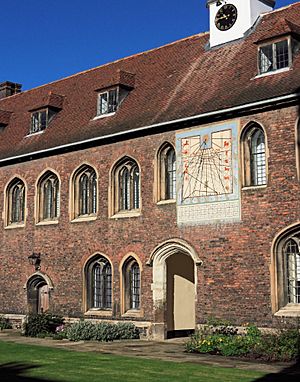John Ponet facts for kids
Quick facts for kids The Right Reverend John Ponet |
|
|---|---|
| Bishop of Winchester | |
| Church | Church of England |
| Diocese | Diocese of Winchester |
| Elected | 8 March 1551 |
| Reign ended | 1553 (Counter-Reformation) |
| Predecessor | Stephen Gardiner |
| Successor | Stephen Gardiner |
| Other posts | Bishop of Rochester (1550–1551) |
| Orders | |
| Ordination | 10 June 1536 (priest) |
| Consecration | 29 June 1550 |
| Personal details | |
| Born | c. 1514 |
| Died | August 1556 Strasbourg |
| Nationality | English |
| Denomination | Anglican |
| Spouse | 2 wives |
| Children | a child |
| Occupation | Theologian |
| Alma mater | Queens' College, Cambridge |
John Ponet (around 1514 – August 1556) was an important English Protestant church leader and writer. He served as the bishop of Winchester. Ponet is best known for his strong ideas that challenged the belief that kings had a "divine right" to rule. This meant he thought people could question or even oppose rulers who were unfair.
Contents
Early Life and Education
John Ponet was born in Kent, England, around 1514. He went to Queens' College, Cambridge, a famous university. In 1533, he earned his first degree and became a fellow at the college. He continued his studies and received his Master of Arts degree in 1535.
A Smart Scholar and Teacher
Ponet was part of a group of smart thinkers called humanists. He studied with Thomas Smith and John Cheke, who were known for teaching a new way to pronounce Ancient Greek. Ponet was also very good at mathematics. He even designed a sundial that was placed at Hampton Court Palace.
In 1536, John Ponet became a priest. From 1539 to 1541, he taught Greek at the university. He also held important jobs at Queens' College during this time. Ponet became a close supporter of Thomas Cranmer, who was the Archbishop of Canterbury. By 1545, Ponet was working as Cranmer's chaplain.
A Reformer in England
By 1548, John Ponet was married. This was a big deal because, at the time, priests were not officially allowed to marry in England. However, laws were changing during the reign of King Edward VI.
Ponet supported Edward Seymour, Duke of Somerset, who was a powerful leader during Edward VI's early reign. When Somerset lost his power, Ponet was arrested in 1549. But he was soon released and began preaching in front of the king.
In March 1550, Ponet was chosen to be the bishop of Rochester. He became a bishop on June 29 of that year. Then, in January 1551, he joined a group that looked into religious issues in Kent.
On March 8, 1551, Ponet became the bishop of Winchester. This was a very important position. As bishop, he agreed to a lower salary to help the government.
Life in Exile
In 1553, Queen Mary I came to the throne. She was a Roman Catholic and brought back Catholic laws. As a Protestant and a married priest, Ponet lost his position as bishop.
Many Protestants, including Ponet and his wife, had to leave England. They became known as Marian exiles. Ponet was the highest-ranking church leader among them. He and his wife went to Strasbourg, a city in Europe.
In 1554, a child was born to them in Strasbourg. They became citizens there in February 1555. John Ponet passed away in Strasbourg in August 1556.
Important Writings
Challenging Political Power
John Ponet's most famous book was A Shorte Treatise of Politike Power (1556). In this book, he strongly argued against the idea that kings had absolute power from God. He believed that if a ruler became a "tyrant" (an unfair and cruel ruler), people had the right to oppose them. Some even thought he supported the idea of removing such a ruler.
This book was very important for later thinkers like John Locke. It also influenced John Adams, who became a president of the United States. Ponet's ideas helped shape how people thought about government and the rights of citizens.
Defending Priests' Marriages
In 1549, Ponet wrote a book called A Defense for marriage of priests by scripture and auncient writers proved. This book argued that priests should be allowed to marry. He used examples from the Bible and early church history to support his view. This was one of the most complete arguments for clerical marriage during the English Reformation.
Other Writings
Ponet also translated a work by Bernardino Ochino in 1549. This book, called A Trageodie, or, Dialogue of the Unjust Usurper Primacy of the Bishop of Rome, argued against the Pope's power. It suggested that the Pope had fallen into heresy.
He also helped create a catechism (a book of religious instruction) in 1553. This catechism later became the basis for another important religious text.
Ponet's Family Life
John Ponet was married twice. His first marriage ended due to a legal issue. A court found that his first wife had already promised to marry another man before she married Ponet. He then married his second wife, Maria Hayman, in October 1551. She was the daughter of one of Archbishop Thomas Cranmer's financial officers.
 | Jewel Prestage |
 | Ella Baker |
 | Fannie Lou Hamer |


